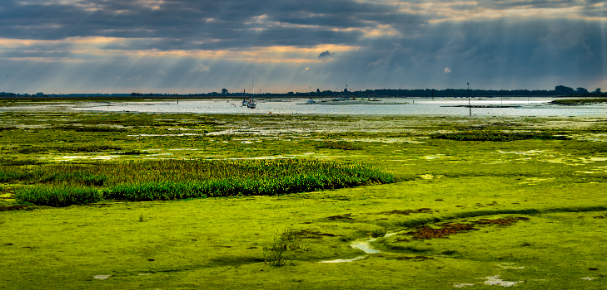Last week, senior leaders from influential organisations met to progress actions to reverse the environmental decline of Chichester Harbour. With a primary focus on improving water quality, the meeting was chaired by Matt Briers, CEO of Chichester Harbour Conservancy. Senior leaders and representatives from the Environment Agency, Natural England, OFWAT, Southern Water, Chichester District Council, Havant Borough Council and Chichester Harbour Trust were in attendance as well as a representative of the MP for Chichester, Jess Brown-Fuller.
Call for strengthened legislation
With several pollution pathways, the complexity of the issues impacting Chichester Harbour’s water quality issues remain of significant concern to the group. Some of the pressures require legislative or policy changes to make a difference. Chichester Harbour Conservancy presented several proposals.
Matt Briers, CEO of Chichester Harbour Conservancy said:
“We know that many pollutants impact the coastal and marine ecosystems of Chichester Harbour: nitrates from sewage and farming, microplastics, chemicals, pharmaceuticals and more. This week we have seen the ban on the sale of wet wipes containing plastic, proving that legislation has the potential to make a profound impact on our environment. As a group we are calling for further legislation across the pollution pathways to fundamentally improve the water quality here in our harbour and across the UK.”
Following discussion, the summit agreed upon policies that should be taken forward for further work, aiming towards legislation change:
- Mandated buffer zones between agricultural land and water courses including ditches.
- All new washing machines to be fitted with a 50-micron microfibre filter by 2030.
- Extend the current regulation of pharmaceuticals and chemicals to ensure they will only be licenced if they do not negatively impact the natural environment.
- Introduce a levy on pharmaceutical and chemical manufacturers to contribute to the costs of research and implementation for water companies to remove compounds during waste-water treatment.
- Any active pesticide substance deemed too harmful for use on crops is also banned from use in veterinary medicine.
- Ban on discharge from ALL vessels within Territorial Waters (12nm) of coast.
- No storm overflows into the protected landscapes after 2035 unless rainfall exceeds 1:10yr event.
- Mandated investment to safeguard or remove historic coastal landfill sites.
- Where possible dwellings with private drainage should be connected to mains sewerage, or private drainage should be licenced.
A catchment-wide approach to nitrate reduction
The bright green macroalgae weed that covers the harbour’s mudflats during summer months is a visual representation of the excess nitrates within the water. These nitrates enter the harbour from sources including a large catchment extending to the South Downs, and the summit discussed the importance and necessity of implementing an integrated catchment-wide approach to reducing nitrates from farmland. The Poole Harbour catchment has made significant progress in nitrate reduction with farmers working collaboratively with the support of the Environment Agency, Wessex Water and National Farmers Union. The summit agreed to form a task group to work towards a similar approach for Chichester Harbour.
